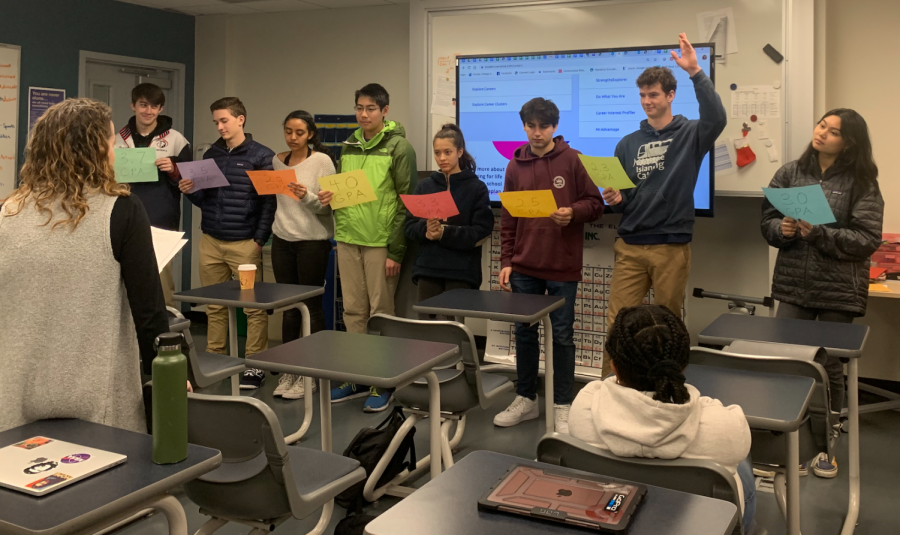Juniors begin college counseling
A group of juniors line up to play the GPA game in college counseling. Juniors will have counseling nine times throughout the semester.
January 22, 2020
WEB EXCLUSIVE Juniors in F Period College Counseling continued their introduction to the college application process by learning specific college admissions terminology as well as a game that aimed to introduce students to the nuances of college admissions.
“I’m looking forward to getting to know this new batch of students, and helping them navigate their college search journey as we prepare them for the college application process,” College Counseling Director Rebecca Munda said. “I really look forward to exposing students to different colleges that are not on their radar.”
College Counseling is a course that will meet nine times throughout the semester during students’ study period. Classes are taught by Cesar Guerrero, Director of Academic Guidance and College Counseling, College Counseling Director Rebecca Munda and College Counselor Thomas Esponette with College Counseling Associate Kelly Whalen who helps organize each class.
“I know absolutely nothing about how to decide which school is right for me and where I should be looking,” junior Saron Asfaw said. “A lot of times when discussing college with friends, you can easily be swayed into applying to the same colleges and universities, but I want to learn how to find and apply to the right place for me.”
Throughout the semester, students will begin to consider what factors are important to them when searching for a college, learn how and where to register for tests like the SAT and ACT, as well as begin drafting their personal essays.
“The purpose of the GPA game is to show students the different factors that are taken into account in college admissions,” said Munda. “It’s a very holistic process and we wanted to share with students the different pieces of the process that colleges consider.”
Students played a game in which each student was given a paper with a specific GPA and and some scenarios written on the back. The students lined up in order of highest GPA to lowest and as Munda read out each scenario, the students shifted up and down the line depending on what their own card read. A student would move up in the line if their card read “Legacy” or “Had an internship” and down the line if the card read “Cheated on a test” or “no volunteering experience.”
“I thought it was a realistic way a college would compare its applicants,” junior Beimnet Lesanework said. “It takes into consideration different circumstances.”
GPA is the most important piece of the admissions process, according to Munda, however colleges consider other factors like family life, academic integrity and extracurriculars when choosing to accept a student.
“I hope that college counseling will help me show my true self to the admissions and not let myself get lost in the ‘what if I am not good enough?’ mindset,” Asfaw said. “I want to show colleges that “this is who I am” and why I would do well at their school.”










